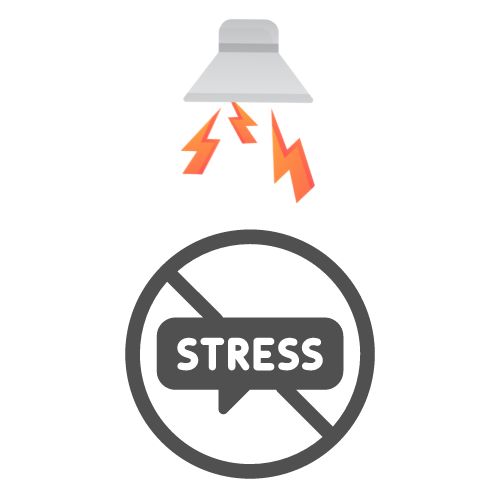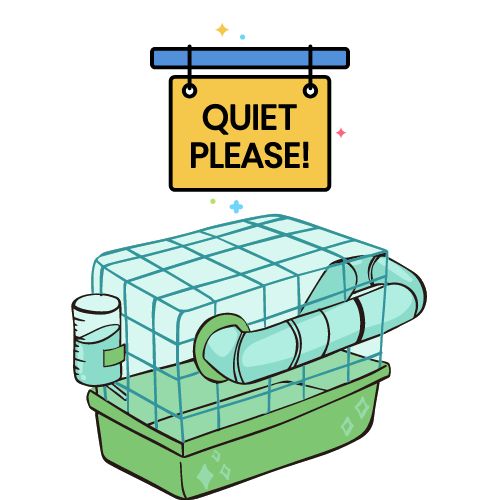We all want is best for our furry friends and that means providing them with an environment that is safe and comfortable. Normally our minds go to cage size, bedding, toys, and more, but one often overlooked factor of a hamster’s environment is the surrounding noise.
Hamsters are very sensitive to loud noises because they are so small and have great hearing, but can they actually die from loud noises?
We’re going to answer that question and provide even more information in the following article. If you want to ensure you are providing the best environment possible for your furry friend keep reading to learn more.
First, we’re going to cover the namesake of this article, can hamsters actually die from loud noises?
Can Hamsters Die From Loud Noises?
Hamsters won’t die as a direct result of loud noises, but the stress and anxiety from those noises can shorten your hamster’s life and lead to an early death.

Unfortunately, hamsters tend to die in unique and odd ways, which often results in myths and questions around how hamsters may come to an early death.
So it’s no surprise that loud noises is one of those myths. The good news is that your hamster won’t die as a direct result of playing loud music in your room or the fire alarm going off in your building.
However, you should still try to avoid loud noises around your hamster because it will stress them out and lead to anxiety. And both stress and anxiety do cause serious health conditions and can contribute to an early death. Hamsters normally live for 2 to 3 years, but that can be shortened if they are constantly stressed.
So while a fire alarm going off won’t immediately result in your hamster’s death, you should still keep them away from loud noises to ensure they live a long and comfortable life.
Are Hamsters Sensitive to Noise?
So if loud noises won’t directly lead to a hamster’s death, but can shorten their lifespan, the next obvious question is whether hamsters are sensitive to noise at all.
And the answer should be fairly clear. Hamsters are sensitive to noise because they are tiny animals with excellent hearing.

Hamsters can hear because they have small bones in their eat that vibrate when they encounter sound waves. Now, those bones are very tiny and delicate and loud noises can actually break those bones. And if those bones break, your hamster will be permanently deaf.
As a result, it’s important to be aware of the noise level in your hamster’s immediate vicinity, just as you would be concerned of your own hearing. Hamster do prefer quiet, so it’s important to give them that luxury.
Would you go front row to a concert in front of speakers without ear protection? In some situations, that can be similar to a hamster’s experience of sitting in their cage while you blare music through a Google Home or Amazon Echo speaker.
And worst of all, hamster’s can’t turn down the music, plug their ears, or let you know it’s hurting them. So it’s best to be proactive and try to realize when something is too loud for your furry friend before it’s too late.
Do Loud Noises Cause Hamsters Stress?
As mentioned earlier, loud noises can be detrimental to a hamster’s health and lead to a shorter life because of the toll that stress and anxiety take on your hamster.
As a result, yes, loud noises cause your hamster stress and should be avoided if possible.
We realize there are instances where fire or smoke alarms go off, cars driving by honking, or even a doorbell. There are times when you can’t avoid loud noises, but you should do everything you can to prevent your hamster from experiencing the negative effects.
We’ll talk about how to protect your hamster in a section further down in this article.
What Noises are Harmful to Hamsters?
So you might be asking about what type of noises? We’ve already mentioned loud music, fire alarms, and doorbells, but there are lots of other noises that you may not think about.
Here are 10 noises that are harmful to hamsters:
| Loud Noises That are Harmful to Hamsters |
|---|
| Loud music |
| High-pitched noises |
| Vacuum cleaner |
| Fireworks |
| Telephone ringing |
| Television at high volume |
| Yelling or screaming |
| Construction noise |
| Barking dogs |
| Fire or smoke alarms |
If a few of those sounds feel familiar in your home, then it may be worth taking steps to keep them away from your hamster. If you have a barking dog, try to keep him or her away from your hamster’s cage.
If there’s construction noise, try to move your hamster’s cage to a quieter part of your home, at least until the construction stops.
You can’t stop loud noises from occurring in your home, but you can try to keep those noises away from your hamster. It’s important for your hamster’s health and well-being, so try to take the appropriate steps to keep them comfortable in their own home.
Effects of Loud Noises on Hamsters
So far we’ve talked about stress and anxiety being the main overarching effects of loud noises on hamsters, but those can contribute to other more noticeable health issues.
After all, it’s difficult for your hamster to tell you they are feeling stressed or anxious. So let’s look at a few of the short and long-term effects on hamsters as a result of continual exposure to loud noises.
Short-Term Effects
The most obvious short term effects of loud noises will include feeling started, which can increase their heart rate, scared or fearful behavior, which can include trembling, and even a decreased appetite.

When hamsters feel threaten or scared, they exhibit a number of other physical symptoms, which can affect their health. The most obvious is that they will stop eating and drinking.
Not to mention that very loud noises can often damage their ear drums and bring on permanent hearing loss as a result of breaking those very delicate bones we covered earlier in this article.
And there aren’t just short-term effects, but long-term effects too.
Long-Term Effects
The short-term effects are the most obvious because they occur right away and you can identify a change in your hamster’s behavior. Long-term effects are a bit more difficult to notice, but they also contribute to health issues.
Long-term effects include prolonged stress and anxiety and an overall decrease in your hamster’s mental and physical health. And possibly the most severe effect of loud noises in the long-term is permanent loss of hearing in your furry friend.
If you notice your hamster’s behavior has changed for the worse, they aren’t eating regularly or finishing their meals, and they aren’t exercising or playing with their toys, there is likely something wrong and exposure to loud noises could be the culprit.
How to Protect Your Hamster From Loud Noises
Now that you know that loud noises are detrimental to a hamster’s health and well-being, there are steps you can take to protect your hamster and keep them happy and comfortable.
Most of these should be obvious, but it’s always good as a refresher. And who knows, you may be surprised at a few of these tips if you didn’t know the noise was an issue in the first place.
Place Cage in a Quiet Area
The first thing you should do is place your hamster’s cage in a quiet area. Ensuring they have peace and quiet to live in their home is paramount to their health and well-being.
Hamsters don’t have the luxury of leaving their cage or escaping from loud noises when locked in their cage. As a result, it’s up to you to ensure they are always in a comfortable environment when in their cage.

If you need help choosing a good spot, we’ve written about the best place to put a hamster cage in the past because it’s such an important topic.
Wear Headphones
Another quick and easy solution to protecting your hamster is to wear headphones to listen to music or play games instead of having that music blare through your speakers.
What may seem quiet to you can be deafening to a hamster so it’s important to be cognizant of what your hamster feels. This is especially important if the TV or speaker is directly next to your hamster’s cage.
Just as you would respect housemates or family members by using headphones, you should convey that same respect to your furry friend, especially because they don’t have the freedom to leave the room.
Move Cage Before Vacuuming
A loud noise that is often a surprise to most hamster owners is the vacuum. You’ve probably seen dogs and cats get scared of vacuums and hamsters are no different. Just because a hamster can’t scurry across the room or bark, it doesn’t mean the vacuum isn’t causing them stress.
And we’re not saying that you shouldn’t vacuum your home; you absolutely should.
But before you do so, you should move your hamster’s cage to a quiet part of the house so they don’t have to be disturbed, scared, or affected by the vacuum.
This is especially important because hamsters are nocturnal, which means they sleep most of the day and are awake during the night. And how often are you vacuuming during the day vs. night?
Don’t Yell Around Your Hamster
This is a quick and easy one; just don’t yell around your hamster. If you’re having an argument in person or on the phone, just walk into another room.
Easy, right?
And this is another often overlooked source of loud noise because you’re the one creating the noise just with your voice. There’s no speaker, TV, video game, or vacuum. Just you and your yelling that can cause your hamster stress and anxiety.
So next time you have a heated conversation, take it to another room for your hamster’s sake.
Video of Relaxing Music for Hamsters
Now, not all music is bad for your hamster. We’ve only said that loud music blaring through your speakers is harmful. But if the music is quiet and relaxing, it can actually decrease your hamster’s stress and anxiety levels.
Here’s a video of relaxing music for your hamster:
Frequently Asked Questions
We’ve covered a lot of topics in this article, but there’s a few more related questions that are often asked alongside a hamster’s exposure to loud noises.
So let’s answer those related questions now.
Do Hamsters Need Quiet to Sleep?
Yes, hamsters should have quiet to sleep because loud noises will keep them awake. Since hamsters are nocturnal and sleep during the day, you should try to keep their cage in a quiet place so they can sleep peacefully.

Are Hamsters OK with Music?
Yes! Hamsters are completely okay with music as long as the music is relaxing, peaceful, and not too loud. Think of soft, quiet, and relaxing classic music instead of heavy metal blaring through your speakers and your hamster will be just fine.
Do Hamsters Have Good Hearing?
Yes, hamsters have very good hearing and are able to actually hear noises at even higher frequencies than humans. That means they can hear things we can’t, which is why it’s especially important to be cognizant of all the noises in your home.
Even if a speaker or TV is off, it can still put out a high-pitched frequency that we can’t hear, but your hamster can, which is why it’s important to keep their cage away from most large electronics.
Can Hamsters Die From Stress?
Yes, hamsters can die from stress because it can lead to a regularly elevated heart rate, more cortisone, and more anxiety. All of those contribute to a shorter lifespan, so ensure your hamster is always feeling relaxed and comfortable in their home if you want them to live a long life.
Additional Reading
If you’re interested in reading more about hamsters, their well-being, and more, check out the following related articles:
- 4 Ways to Get a Hamster to Sleep – WikiHow
- Hamster Sounds and Their Meanings – PetKeen
- How to Help a Stressed Hamsters – PetsRadar
Conclusion
And there you have it! We covered a lot of topics in this article about a hamster’s well-being when it comes to loud noises and their environment.
Since hamsters live their entire life in a cage in your home, it’s important to make sure their environment is suitable for them to life a happy and comfortable life and that means keeping them away from loud noises.
What may be comfortable for you isn’t always comfortable for your furry friend, so take the right steps to keep them away from loud nosies, lower stress levels, and give them a suitable home.